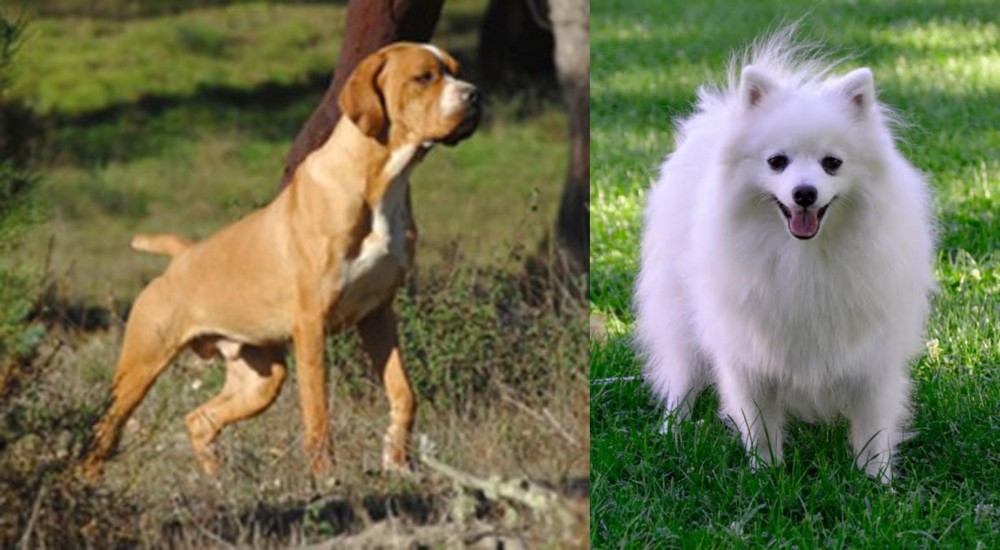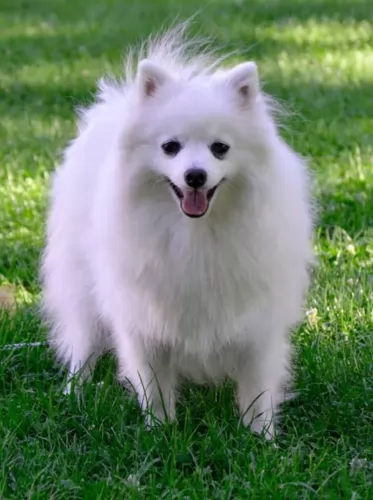 Petzlover
Petzlover Portuguese Pointer is originated from Portugal but Volpino Italiano is originated from Italy. Portuguese Pointer may grow 30 cm / 12 inches higher than Volpino Italiano. Portuguese Pointer may weigh 15 kg / 34 pounds more than Volpino Italiano. Both Portuguese Pointer and Volpino Italiano has almost same life span. Both Portuguese Pointer and Volpino Italiano has almost same litter size. Portuguese Pointer requires Low Maintenance. But Volpino Italiano requires High Maintenance
Portuguese Pointer is originated from Portugal but Volpino Italiano is originated from Italy. Portuguese Pointer may grow 30 cm / 12 inches higher than Volpino Italiano. Portuguese Pointer may weigh 15 kg / 34 pounds more than Volpino Italiano. Both Portuguese Pointer and Volpino Italiano has almost same life span. Both Portuguese Pointer and Volpino Italiano has almost same litter size. Portuguese Pointer requires Low Maintenance. But Volpino Italiano requires High Maintenance
 The Portuguese Pointer comes from Portugal where the dog was developed as a gun dog. It is believed that the dog is descended from the Spanish Pointer and developed to point out game.
The Portuguese Pointer comes from Portugal where the dog was developed as a gun dog. It is believed that the dog is descended from the Spanish Pointer and developed to point out game.
The dog was was recognized by the United Kennel Club in 1996.
The dog was introduced to England in the 18th century and the modern type of the Portuguese Pointer became established in the early 1900’s when the breed had become endangered. A group of breeders re-established its numbers.
Today it is both working- and companion dog. The UK Kennel Club recognised it as a breed in 2014.
 This Italian bred dog is Spitz-type and very ancient. The Spitz breeds have been around since at least 4000BC. Archeologists have found remains that match the Spitz heritage of fox like heads, curly tails, erect small ears. In Greece in 400BC there were engravings of these dogs. Michelangelo painted the breed as he lived with one. In 1888, the Queen of England – Victoria – brought 6 back to England from Florence.
This Italian bred dog is Spitz-type and very ancient. The Spitz breeds have been around since at least 4000BC. Archeologists have found remains that match the Spitz heritage of fox like heads, curly tails, erect small ears. In Greece in 400BC there were engravings of these dogs. Michelangelo painted the breed as he lived with one. In 1888, the Queen of England – Victoria – brought 6 back to England from Florence.
The Italians have loved the Volpino for centuries. These little dogs that resemble the Pomeranian so much but existed much before them. It was very early in the history of the domesticated dog that the Volpino moved from north to south. The Italians called them Volpino because it means foxy dog. They also called them Lupino which means wolfy dog.
The breed was never seen outside of its home range in Italy until the 1880’s and it is still a rare breed. However since the 1980’s the breeders of the American Eskimo brought some from Italy to the US and claimed they were American Ekimo runts. They interbred the Volpino with the American Eskimo creating the toy and mini Eskimo.
The Volpino was a guard dog alerting the Mastiffs to the presence of intruders. The Mastiff would then respond to the intruder. The Volpino was also a popular companion animal due to their easy temperament and their high intelligence level. However they grew less popular and by 1965 there were only a few registered dogs left. There was an attempt to revive the breed in 1984 when dogs that still lived on farms were used as new stock. Even with this, they remain a rare breed and only about 4000 are alive throughout the world.
The Volpino have been denied AKC registration or stock registration as they are considered to be too much like the American Eskimo Dog. However they are recognized by the FCI, the UKC, the ENCI (Italian National Kennel Club), the North American Volpino Club, the Volpino Italiano Health and Genealogy Club and the Volpino Club of America.
 Originating from Portugal, the attractive, almost Boxer-like looking dog is a medium sized purebred dog that stands at between 48 and 60cm in height and weighs roughly 16 to 27kg.
Originating from Portugal, the attractive, almost Boxer-like looking dog is a medium sized purebred dog that stands at between 48 and 60cm in height and weighs roughly 16 to 27kg.
The Portuguese Pointer has a coat that is light brown, tan or yellow. The dog has a short, easy to maintain coat. He has a fairly square face, much like the Boxer, floppy ears with a long tail. The tail is usually docked. The eyes are brown and he a bright, alert, kind expression.
The Portuguese Pointer is a dog with strong hunting instincts, but who still has time to make a splendid companion for his human family. He is gentle and loyal to his human family, being somewhat reserved with strangers. This is a good thing really as this makes him a good watchdog.
He is good with other pets in the home as well as with children. He badly wants to please his family, and because he is intelligent and a fast learner, you won’t have any trouble with training and socialization.
He is a sociable dog, loving to be close to its owner. He is active and will require quite a bit of exercise, loving to join in with games with the children. He gets on well with children in the home as well as with animals.
 The Volpino is about the same size as the Pomeranian and smaller than the American Eskimo Dog. They are a rare breed and they have a soft, thick coat and they can be red, white or champagne. With the pointed ears and muzzles, they do look like a fox. They have large thick tails curling over their back and they have double coats.
The Volpino is about the same size as the Pomeranian and smaller than the American Eskimo Dog. They are a rare breed and they have a soft, thick coat and they can be red, white or champagne. With the pointed ears and muzzles, they do look like a fox. They have large thick tails curling over their back and they have double coats.
 The gorgeous Portuguese Pointer makes such a loyal and loving pet. He is always looking out for his human family, making sure that they are safe and protected under his watch.
The gorgeous Portuguese Pointer makes such a loyal and loving pet. He is always looking out for his human family, making sure that they are safe and protected under his watch.
He is an excellent watch dog too, proudly running around outside and making sure that there are no intruders around. They are good with kids too if the kids are gentle and kind with animals.
He loves a good game too and is always ready to take part in any activities you’re taking part in. The Portuguese Pointer is truly an awesome pet and companion.
 Your robust Portuguese Pointer isn’t known to be a dog to suffer with too many breed related health problems. With good care he can reach 14 years of age.Portuguese Pointers are a healthy breed, but some health issues can crop up -
Your robust Portuguese Pointer isn’t known to be a dog to suffer with too many breed related health problems. With good care he can reach 14 years of age.Portuguese Pointers are a healthy breed, but some health issues can crop up -
Cancer is a leading cause of death in dogs young and old. Luckily, if caught early, cancer is curable. Some of the cancers found in dogs are malignant lymphoma – a tumor of the lymph nodes.
Skin cancer is also fairly common. The warning signs of cancer in dogs can be a new lump or a wound that won’t heal. While these are classic signs, sometimes there are no signs. If your dog isn’t feeling well, it’s time to get him to the veterinarian.
The liver is one of the vital body organs but it is susceptible to a wide variety of problems. It detoxifies the blood, stores vitamins and assists with digestion among other things.
One of the most common symptoms of liver disease is jaundice. When the liver isn’t functioning properly, bilirubin builds up in the blood and leads to the yellowish appearance of the dog.
Other common symptoms of liver disease include vomiting, weight loss and diarrhea. Veterinary attention will be required.
 The Italian Volpino has better health than most dogs due to so much isolation for so many years. However they are susceptible to some diseases and genetic issues.
The Italian Volpino has better health than most dogs due to so much isolation for so many years. However they are susceptible to some diseases and genetic issues.
• PLL Primary Lens Luxation – Genetic mutation of the eye. Very painful and usually occurs between 4 and 8 years of age. Usually results in euthanasia.
• Patellar Luxation – moving knee cap – can result in lameness and/or arthritis.
 The Portuguese Pointer has been a working dog and doesn’t enjoy lying around with nothing to do. Apart from a walk every day which he loves, he’ll want other activities that stimulate him mentally and physically.
The Portuguese Pointer has been a working dog and doesn’t enjoy lying around with nothing to do. Apart from a walk every day which he loves, he’ll want other activities that stimulate him mentally and physically.
His short coat means that he won’t require any special grooming. He does shed constantly, like many other dogs, and a good brush twice a week will keep his short coat vibrant and shiny.
Your canine friend will require protein in his diet as well as all the vitamins ad minerals for health. The very best commercially manufactured dog foods will be required for his health.
The dry kibble can be a wonderful convenient way to feed your pet. The best commercial foods meet the requirements for a dog’s diet. Give him some delicious home made food too. Boiled chicken, brown rice, sweet potatoes, carrots and spinach can be cooked in bulk and then chopped up and small portions mixed into the dry kibble twice a week as a treat.
It provides your pet with an alternative to the dry kibble, it is healthy, easy to digest and your pet will love it. Dogs thrive on simple consistency. Once in a while you can also give him some raw meat. Never leave him without a constant supply of fresh, cool water.